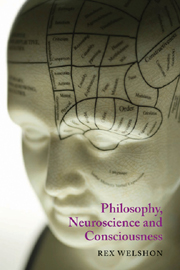Book contents
- Frontmatter
- Contents
- Preface
- Introduction
- PART I PHILOSOPHY AND CONSCIOUSNESS
- 1 Consciousness and conscious properties
- 2 Identity, supervenience, reduction and emergence
- 3 Reductive and non-reductive physicalisms
- 4 Representationalist theories of conscious properties
- PART II NEUROSCIENCE AND CONSCIOUSNESS
- PART III PHILOSOPHY, NEUROSCIENCE AND CONSCIOUSNESS
- Concluding semi-scientific postscript
- Appendix Functional neuroanatomy
- Notes
- Bibliography
- Index
3 - Reductive and non-reductive physicalisms
from PART I - PHILOSOPHY AND CONSCIOUSNESS
- Frontmatter
- Contents
- Preface
- Introduction
- PART I PHILOSOPHY AND CONSCIOUSNESS
- 1 Consciousness and conscious properties
- 2 Identity, supervenience, reduction and emergence
- 3 Reductive and non-reductive physicalisms
- 4 Representationalist theories of conscious properties
- PART II NEUROSCIENCE AND CONSCIOUSNESS
- PART III PHILOSOPHY, NEUROSCIENCE AND CONSCIOUSNESS
- Concluding semi-scientific postscript
- Appendix Functional neuroanatomy
- Notes
- Bibliography
- Index
Summary
Identity, supervenience-based reduction and non-reduction, and emergence are ontological options for conscious properties alive in the contemporary philosophical debates about consciousness. In this chapter, four substantive philosophical arguments for and against these options are entertained and rejected. These four argument types represent some of the most influential efforts by philosophers to fix the limits of debate about conscious properties. They use either considerations about the nature of the language used to talk about conscious properties or considerations about the logic of certain proposed relations between them and the brain's activity to buttress certain positions. Showing that these arguments are unsound clears the ground early and forestalls misleading appeals to them later. That in turn warrants a different kind of philosophizing about conscious properties, one informed as much by scientific discovery as by a priori argumentation.
The four arguments we consider fall into two classes: those about reductive physicalism and those about non-reductive physicalism. The first class includes arguments commonly made for reductive physicalism by old-fashioned type identity theorists on the strength of semantic considerations and those made against reductive physicalism by certain functionalists on the strength of an argument from the multiple realizability of conscious properties. The second class includes those made against non-reductive physicalism by certain other functionalists on the basis of the logical properties of supervenience and those made for non-reductive physicalism on the basis of the anomalous nature of conscious properties.
- Type
- Chapter
- Information
- Philosophy, Neuroscience and Consciousness , pp. 54 - 76Publisher: Acumen PublishingPrint publication year: 2010



